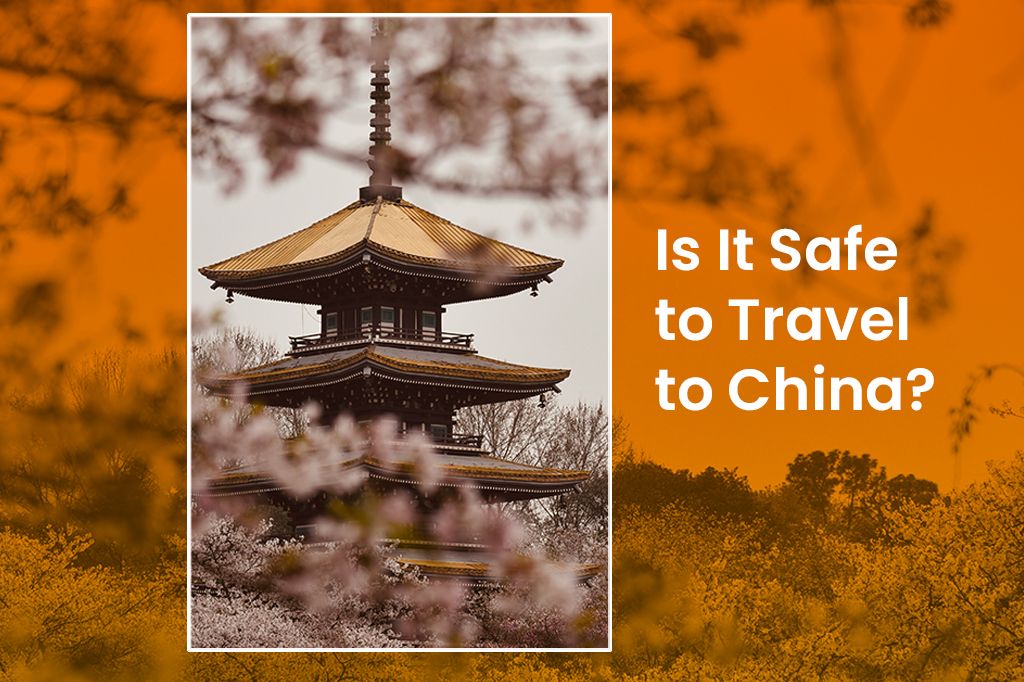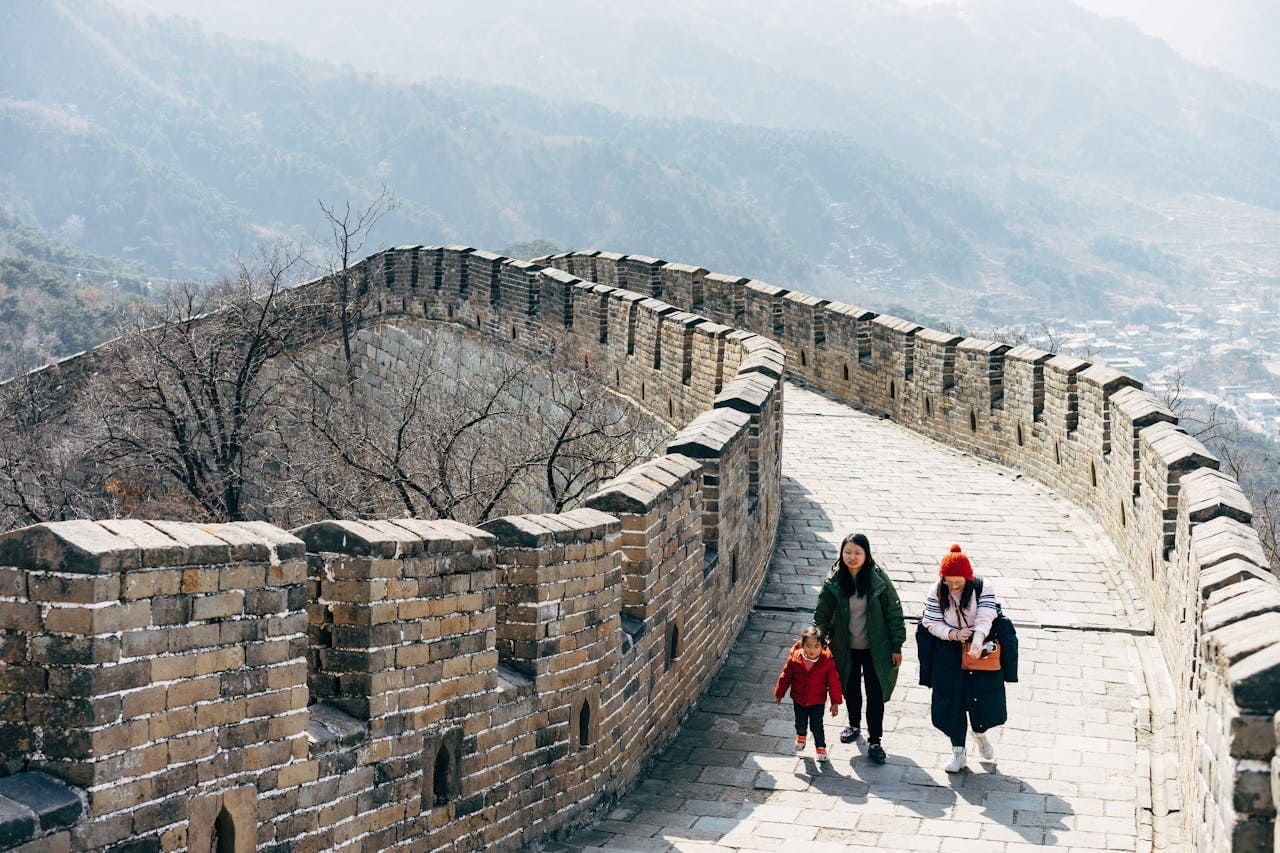If you’re thinking about visiting China, one of your first questions is probably: Is it safe? You might have heard about security cameras or ID checks, which can seem a bit intimidating if you’re not used to them. It’s natural to wonder if that could make travel feel uncomfortable.
But in reality, China is generally very safe for travelers. Most visitors find it clean and orderly, and often say they feel safer walking around Chinese cities than in many other parts of the world.
To help you feel more prepared, this guide will give you a clear, honest look at what traveling in China is like in 2025. We’ll cover what’s changed, what to expect day-to-day, and what different types of travelers should keep in mind.

Picture by Danny Chen on Unsplash
Safety Snapshot: What the Data Really Says
When it comes to travel safety, China ranks relatively well compared to many other countries. According to crime and safety indexes from Numbeo (a global crowd-sourced database of cities and countries), China’s safety levels are similar to those of countries like Japan and Hong Kong, and even better than the United States and Mexico in terms of crime:
| Country | Crime Index (Numbeo) | Safety Index (Numbeo) | Notes |
|---|---|---|---|
| Japan | 22.9 | 77.1 | Very safe, low crime |
| Hong Kong | 21.5 | 78.5 | High safety |
| China (major cities) | 28 | 70 | Low violent crime, safer cities |
| Thailand | 36.8 | 63.2 | Moderate safety |
| United States | 49.1 | 50.9 | Higher crime, less safe |
| Mexico | 54.7 | 45.3 | High crime, especially homicides |
For example, Shanghai has a crime index of 27.05 and a safety score of 72.95, while Guangzhou’s crime index is 29 with a safety score of 71. These cities mainly face petty theft issues, with very low rates of violent crime or attacks based on ethnicity or gender. Beijing and Chengdu generally have similar safety profiles, though exact 2025 data is not available.
However, according to the Supreme People’s Procuratorate of China, there was a 37.2% increase in arrests and a 17.1% increase in prosecutions over the past year. Most cases involved organized crime, telecom fraud, financial fraud, and online gambling. This rise reflects increased law enforcement efforts rather than a surge in violent crime.
Health & Medical Care: Getting Sick in China
What happens if you get sick while traveling in China? China has good medical facilities in major cities, but services can be limited in rural areas. As a rule of thumb, travelers should take basic health precautions like drinking safe water, eating well-cooked food, and protecting against insect bites. If you feel unwell, seek medical help early, especially if symptoms worsen.
Medical care can be expensive for foreigners, so having travel health insurance that covers treatment in China is highly recommended. Also, pharmacies are widely available in cities, but medicine quality may vary, so bring any prescription medications you need.
One of the best ways to avoid health problems while in China is by getting the right vaccines before you go. Vaccines help protect you from common diseases you might not be exposed to at home, reducing the chance of falling ill and needing medical care. Here are the vaccines recommended for most travelers:
-
Hepatitis A: Protects against illness from bad food or water.
-
Typhoid: For travelers staying longer or visiting rural areas where food and water might not be clean.
-
Tetanus, Diphtheria, and Polio: A booster shot is a good idea, especially if you’ll be outside cities.
-
Hepatitis B: For people who might be exposed to blood or medical procedures.
-
Japanese Encephalitis: For visits to rural areas during mosquito season (June to October).
-
Rabies: If you will be around animals or in rural areas a lot.
-
Meningitis: For those who will live in close groups, like students.
-
Flu shot: Recommended every year.
-
Measles, Mumps, Rubella: If you haven’t had this vaccine or were born after 1957.
-
Chickenpox and Shingles: If you haven’t had these diseases or vaccines before.
There is little risk of malaria in China, mainly in some southern parts. Most travelers don’t need medicine for malaria unless they go to rural or forest areas. Overall, staying up-to-date with vaccinations, practicing good hygiene, and preparing for emergencies will help you stay healthy during your trip to China.

Legal Gray Zones: What Could Get You in Trouble
There are some Chinese laws and rules that might surprise you. Things that seem normal or okay back home could cause real problems there.
For instance, many people use VPNs to access websites and services that are restricted in China. Officially, only government-approved VPNs are allowed, which means these services may allow the government to monitor your online activity. Popular VPN services might be blocked, and using unapproved ones could technically violate local laws. In practice, however, enforcement targets VPN providers rather than individual users, but it’s still a good idea to be mindful and know the risks.
Another thing to keep in mind is that taking photos of certain locations, like government buildings or security checkpoints, can raise concerns in China. If you’re seen photographing these areas, it’s possible that you could be approached by authorities and asked to delete the pictures. This rule is especially enforced in major cities and sensitive locations, so it’s best to be discreet or avoid taking any photos in such areas.
China also has very strict drug laws, and even small amounts of illegal substances can result in serious legal consequences. What might be permitted in your home country could be banned in China, so it’s important to be cautious and stay informed about what is allowed.
When it comes to digital communication, WeChat is the primary app used by most people for messaging and payments. It’s widely monitored by authorities, particularly when it comes to political or sensitive topics. So, it’s best to use WeChat for everyday activities like making payments.
Culture and Customs: Safety Through Respect
One of the most important things when you visit China is understanding and respecting local customs. A simple example is how you give and receive things. In China, it’s polite to use both hands when handing over money, gifts, or important documents. It’s a gesture of respect that shows you’re paying attention to the interaction. If you use only one hand, it could be seen as rude or careless.
There are also a few public behaviors you should be mindful of. In many places in China, spitting in public is still quite common, but it’s considered inappropriate in urban areas and tourist spots. To stay respectful of local customs and avoid health risks, it’s best not to spit.
Another important social norm is queuing. In China, people expect an orderly line, especially in busy spots like transportation hubs, shops, and ticket counters. Cutting in line is disrespectful, and doing so could get you in trouble.
When it comes to drinking, you’ll find that alcohol is often a part of social and business life. If you’re invited to join a toast, remember that it’s polite to hold your glass lower than someone of higher status, and it’s customary to finish your drink after a toast.
When meeting someone, avoid physical contact like hugging or backslapping unless you’re very close to that person. A simple handshake or a slight nod is enough. Address people by their surname and add “Mr.” or “Mrs.” unless they invite you to use their first name. Keep conversations polite and avoid personal topics like age, income, or politics, which can make it uncomfortable. Also, don’t point directly at others as it’s considered rude and can come off as hostile. Lastly, being on time is really important in China. Being late to meetings or social events is seen as disrespectful and can leave a bad impression.
If you’re visiting temples or rural areas, dress conservatively with long pants or skirts that cover the knees. Sleeveless tops or shorts are generally seen as inappropriate. When entering a temple, remove your hat and sunglasses, and keep your voice low.

Emergency Prep You’ll Actually Use
Here are the most common emergency contacts in China in case you need to handle urgent situations, whether it’s a medical emergency, crime, or natural disaster.
-
110 – Police: For any police-related emergencies like theft, robbery, or assault. This is the number to dial when you need immediate help from law enforcement.
-
120 – Ambulance: For medical emergencies requiring urgent care. Be ready to describe the situation and give your exact location.
-
119 – Fire: Dial this number for fires or fire-related emergencies. Clearly explain the location and the seriousness of the fire.
-
122 – Traffic Accidents: For accidents on the road, involving police or medical teams.
-
12110 – Police (Text Message): If speaking is difficult, you can send a text to the police, which is helpful in certain situations.
-
12395 – Maritime SOS: For emergencies at sea, like shipwrecks or man overboard.
-
114 – Directory Assistance: Use this for general information like train schedules, weather, or even phone number inquiries.
These numbers are free to call and operate 24/7 across China, so don’t hesitate to use them in emergencies.
In major cities like Beijing and Shanghai, emergency services may offer assistance in multiple languages, including English. For example, Shanghai’s 110 hotline provides support in eight foreign languages. If you don’t speak Chinese, just ask for language help when calling.
Your embassy can help in a variety of ways, like lost or stolen passports, medical issues, or legal problems. They can help you find doctors or lawyers, replace documents, and notify your family. In emergencies like natural disasters, embassies can also give evacuation instructions. However, there are limits to what an embassy can do. They cannot intervene in local legal proceedings or secure your immediate release from detention. They don’t offer legal services or pay for your medical bills. They can’t help with personal disputes or money problems. You’ll still need to follow the laws of the country you’re in.
If you need internet while you’re in China, a free eSIM from Yoho Mobile is an easy option. There’s no need for a physical SIM card or a contract, just set it up and you’re online in minutes. If you decide to buy a data plan, you can use the code YOHO12 at checkout to get 12% off.
Final Verdict: Is It Safe to Travel to China in 2025?
Traveling in China in 2025 can be safe and rewarding, but it really depends on how well you’re prepared and what type of traveler you are. The key is understanding the risks and knowing what to expect in different parts of the country.
In terms of safety, there are a few things to keep in mind. While major cities are generally very safe, there are regions where the enforcement of laws can be more stringent, so stay informed about any specific rules for the area you’re visiting. As for crime, petty theft, like pickpocketing, can happen in crowded tourist spots, but violent crime remains rare. It’s also worth noting that China experiences natural events like typhoons and earthquakes in certain areas, so always check weather conditions ahead of time.
On the positive side, China offers many conveniences. Major cities like Beijing, Shanghai, and others are home to modern healthcare facilities and efficient public transportation, making travel easier and safer. If you’re visiting for a short period, China’s 10-day visa-free transit policy can be a great advantage. The country is home to a wealth of cultural and historical sites, from ancient temples to world-famous landmarks, all of which offer unique experiences for visitors. Tech-savvy travelers will appreciate how easy it is to use ride-hailing apps like Didi and pay for goods and services with mobile apps like Alipay or WeChat Pay.
In the end, China can be a safe and enriching destination with the right preparation. Understand local customs, stay informed about regional conditions, and plan ahead to fully enjoy everything China has to offer in 2025.

If You Go: Final Safety Checklist for China in 2025
Before traveling to China, make sure you complete this final safety checklist to ensure a safe trip. Here’s what to take care of:
-
Passport: Ensure your passport is valid for at least six months beyond your planned stay.
-
Copies: Carry both physical and digital copies of your passport, visa, and travel insurance.
-
Accommodation Details: Have printed address cards of your accommodation and key destinations in Chinese characters for easy communication with taxis or locals.
-
Embassy Registration: Register your trip with your home country’s embassy or consulate. - Essential Apps: Install apps like WeChat, Alipay, Didi, and offline maps such as Baidu Maps or Maps. me before arrival.
-
VPN Software: If you plan to access websites or apps that are blocked in China, download a VPN (Virtual Private Network) before leaving. VPN downloads are restricted inside China.
-
Offline Tools: Save translation apps like Pleco or Papago and store PDFs of your itinerary, emergency contacts, and local emergency numbers on your phone.
-
Routine Vaccinations: Ensure your vaccinations are up to date, including Hepatitis A and B, Typhoid, and Tetanus.
-
Prescription Medications: If you rely on personal medications, bring them with documentation. Some medications might not be available or could have different names in China.
-
Travel Insurance: Purchase comprehensive travel insurance that covers medical emergencies, evacuation, and trip cancellations.
-
Emergency Numbers: Save local emergency numbers, including 110 (police), 120 (ambulance), and 119 (fire).
-
Digital Backups: Always maintain digital backups of important documents and emergency contacts in case you lose anything.
FAQs Most Travel Guides Skip
Can I bring prescription medication, and how much?
Yes, you can bring prescription medication into China for personal use, but only in reasonable amounts for the duration of your stay. Make sure to carry the original prescription and a doctor’s note. Keep the medication in its original packaging with labels. For controlled substances (like opioids or psychotropics), stricter rules apply, and you might need special permits. Always declare your medication at customs. It’s recommended to check if your medication is available locally and only bring the necessary amount. Consult with your embassy or Chinese authorities for specific guidelines.
How do I use a public restroom in rural areas?
In rural China, public restrooms often have squat toilets. To use them, position your feet on the footrests next to the hole and squat facing the door. Carry your own toilet paper, as it may not be provided, and dispose of it in the trash. Hand sanitizer is a good idea since soap may not always be available. Privacy may be limited, with some stalls having no doors or partial coverings. Be patient in queues and wear clothing that’s easy to adjust.
Are drone cameras legal in China?
Drones are legal in China but are subject to strict regulations. All drones must be registered with the authorities, regardless of their size. The maximum flight altitude is 120 meters (about 400 feet), and flying higher requires a commercial license. Drone operators must keep the drone within visual sight and avoid restricted areas such as airports or military zones. Commercial drone use needs additional permits and certification. Registration requires a Chinese phone number and some knowledge of the language. Failure to follow the rules may lead to fines or confiscation.
What should I know about domestic flights in China?
For domestic flights in China, passengers must show a valid ID (passport for foreigners) when buying tickets and checking in. Checked luggage allowances are typically 20 kg for economy class and 30 kg for business class. Real-name registration is required for all passengers. Flight schedules can vary by season, with more flights during peak times. Major cities have well-connected airports. Arrive early for security and document checks. Masks may still be required during boarding, so it’s good to check airline policies and flight statuses in advance.
